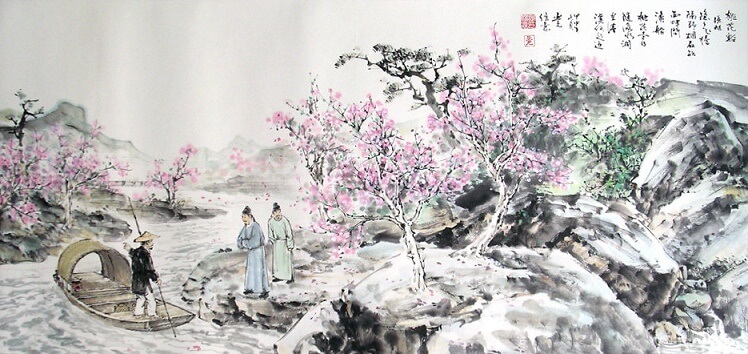Peach-blossom River
- Poetry of Zhang Xu
《桃花溪》Seven-character-quatrain
There is a peach blossom story that runs through Chinese literature. In the 4th century, a fisherman came to a cave in a stream. He thought he could see daylight at the far end. So he went in and then out the other side. There he found a village where people had lived an ideal life -- Zhuangzi-style ideal, where you live simply, write with knots, and never want to go anywhere else -- for the last seven hundred years. They treated him like an honored guest and he learned they knew nothing of anything that had happened in the long interim. The next day he left and reported to the magistrate what he had found. But no one could ever find the cave again.

A bridge flies away through a wild mist,
Yet here are the rocks and the fisherman's boat.
Oh, if only this river of floating peach-petals
Might lead me at last to the mythical cave!
隐隐飞桥隔野烟,石矶西畔问渔船。
桃花尽日随流水,洞在清溪何处边?
- Why Chinese poems is so special?
- The most distinctive features of Chinese poetry are: concision- many poems are only four lines, and few are much longer than eight; ambiguity- number, tense and parts of speech are often undetermined, creating particularly rich interpretative possibilities; and structure- most poems follow quite strict formal patterns which have beauty in themselves as well as highlighting meaningful contrasts.
- How to read a Chinese poem?
- Like an English poem, but more so. Everything is there for a reason, so try to find that reason. Think about all the possible connotations, and be aware of the different possibilities of number and tense. Look for contrasts: within lines, between the lines of each couplet and between successive couplets. Above all, don't worry about what the poet meant- find your meaning.
- A Song of the Spring Palace
- Poems on Army Life IV
- Poems on Army Life V
- West Palace, Autumn
- Hearing the River-Song
- The Lotus Gatherers